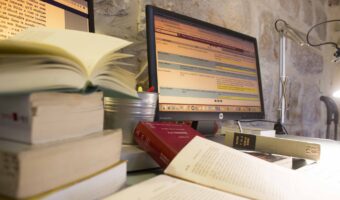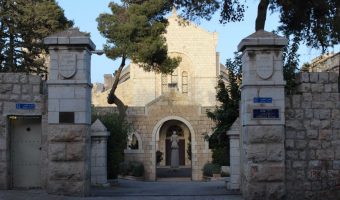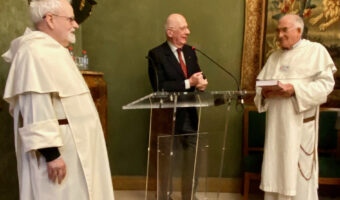International Conference of the ERC program
JUDAISM AND ROME
organized by Katell Berthelot, PI
Aix-en-Provence, Maison Méditerranéenne des Sciences de l’Homme, 18-20 June 2018
Scientific Committee: Katell Berthelot, Natalie Dohrmann, Yair
Furstenberg, Capucine Nemo-Pekelman
Monday, June 18
9h-9h30: Welcome and Introduction (Katell Berthelot, CNRS /
Aix-Marseille University)
Comparing Legal Systems
9h30-10h15: Natalie Dohrmann (University of Pennsylvania), “Ad
similitudinem arbitrorum: On the Uses of Commensurability & Comparison
in Ancient and Modern Sources”
Accessing Imperial Justice
10h45-11h30: Clifford Ando (University of Chicago), “Performing
Justice in Republican Empire”
11h30-12h15: Aitor Blanco-Pérez (University of Navarra), “Appealing
for Imperial Justice: Provincial Petitions and Roman Responses Prior
to Late Antiquity”
12h15-13h00: Leanne Bablitz (University of British Columbia,
Vancouver), “The Vocabulary of Legal Spaces”
The Status of Local Law within the Empire
14h00-14h45: Julien Dubouloz (Aix-Marseille University), “Les
administrateurs romains pouvaient-ils dédaigner les droits des
communautés provinciales?”
14h45-15h30: Yair Furstenberg (Hebrew University of Jerusalem),
“Making Space for Local Law: Towards a New Paradigm of Jewish
Jurisdiction in Roman Palestine”
Experts and Mediators of Roman Law
16h-16h45: Julien Fournier (University of Lorraine), “Les ekdikoi,
représentants des communautés civiques de Grèce et d’Asie Mineure
devant les tribunaux impériaux”
16h45-17h30: Capucine Nemo-Pekelman (Paris Nanterre University), “The
Jewish Infra-civic Elites from the West: Their Judicial and Legal
Activities”
Tuesday, June 19
Knowledge and Diffusion of Roman Law
9h-9h45: Catherine Hezser (SOAS, University of London), “Did
Palestinian Rabbis Know Roman Law? Methodological Considerations
Concerning the Relationship Between Rabbinic Halakhah and Roman
Legislation”
9h45-10h30: Caroline Barron (CNRS / Aix-Marseille University),
“Transculturation: Legal Changes and the Role of Roman Law in Roman
Baetica”
11h-11h45: Kate Cooper (Royal Holloway, University of London),
“Domestic Violence and Legal Hybridity: The Case of P. Oxy 903”
11h45-12h30: David Kremer (Paris Descartes University), “La diffusion
du droit romain en Orient à l’époque tardive. L’apport des Sententiae
Syriacae”
Afternoon: Trip to Glanum and Arles
Wednesday, June 20
Reception of Roman Law: Status, Family and Inheritance
9h-9h45: Anna Dolganov (Austrian Academy of Sciences, Vienna), “Si de
hereditate ambigitur: Roman Jurisdiction in Testamentary Matters and
its Provincial Reception”
9h45-10h30: Yael Wilfand (CNRS / Aix-Marseille University), “‘A
Proselyte whose Sons Converted with Him’: Roman Laws on New Citizens’
Authority over their Children and Tannaitic Rulings on Converts to
Judaism and their Offspring”
11h-11h45: Orit Malka (Tel Aviv University) and Yakir Paz (Hebrew
University of Jerusalem), “Captivus civiliter mortuus est: Captivity
and Property Rights in Roman and Rabbinic Law”
11h45-12h30: Yifat Monnikendam (Tel Aviv University), “What to Do with
Roman Law? The Exposed Child in Jewish and Christian Late Antique
Legal Discourse”
Challenging Imperial Justice
13h30-14h15: Kaius Tuori (University of Helsinki), “Between the Good
King and the Cruel Tyrant: Acta Isidori and the Images of Roman
Emperors among Provincial Litigants”
14h15-15h00: Hayim Lapin (University of Maryland), “Representing State
Judicial Violence in Palestinian Rabbinic Literature”
15h30-16h15: Ari Bryen (Vanderbilt University), “A Frenzy of
Sovereignty: Punishment in the Aktenbuch”
16h15-17h00: Kimberley Fowler (CNRS / Aix-Marseille University), “A
Re-examination of Early Christian Perspectives on the Relationship
between Roman Law and Mosaic Law
17h15-18h00: Conclusion (Christine Hayes, Yale University) and final discussion



